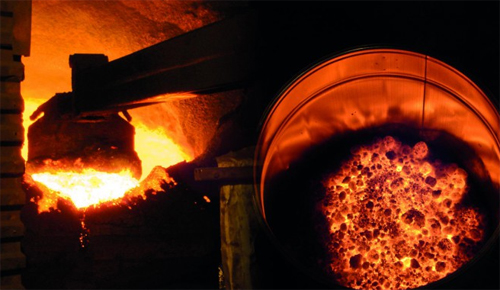
Efficiency is a crucial aspect of steelmaking, as it directly impacts productivity, cost-effectiveness, and environmental sustainability. Various factors contribute to improving steelmaking efficiency, and one element that has proven to be beneficial is calcium. In this article, we will explore the role of calcium in enhancing steelmaking efficiency and its impact on the steel industry.
One of the significant contributions of calcium to steelmaking efficiency is its desulfurization efficiency. Calcium has a strong affinity for sulfur, allowing it to react readily with sulfur present in the molten steel. This reaction forms calcium sulfide (CaS), which has a higher melting point than steel. As a result, calcium sulfide tends to float to the surface, making it easier to remove from the molten steel. The efficient removal of sulfur through calcium desulfurization processes leads to improved steel cleanliness, reduced sulfur content, and enhanced mechanical properties. By reducing the need for additional refining processes, calcium contributes to higher efficiency in steel production.
Calcium also plays a role in controlling the oxygen content in steel. Oxygen, if not adequately controlled, can lead to the formation of undesirable oxides that negatively affect the steel's properties. Calcium's strong affinity for oxygen allows it to react with the dissolved oxygen in the molten steel, forming calcium oxide (CaO). The formation of CaO promotes the removal of oxygen and reduces the presence of harmful oxides. This oxygen control enhances steel cleanliness, improves mechanical properties, and ensures better quality. By effectively managing oxygen levels, calcium aids in streamlining the steelmaking process and increasing overall efficiency.
The use of calcium in steelmaking can contribute to energy efficiency. Calcium-based desulfurization processes, such as calcium injection, require lower temperatures compared to other methods. This reduced temperature requirement not only saves energy but also minimizes the wear and tear on refractory linings, resulting in longer operational lifetimes for furnaces. Furthermore, the lower sulfur content achieved through calcium desulfurization can lead to reduced energy consumption during subsequent processing steps. By improving energy efficiency, calcium helps to reduce operating costs and environmental impact, making the steelmaking process more sustainable.

The efficient use of calcium in steelmaking can lead to a reduction in scrap and rework. By effectively controlling impurities like sulfur and oxygen, calcium helps produce steel with consistent and desired properties. This consistency minimizes the risk of producing off-specification steel that would otherwise require rework or be scrapped. By reducing scrap and rework, calcium contributes to improved yield and cost-effectiveness in steel production.
Calcium offers cost-effective benefits for steelmaking processes. It is readily available and relatively inexpensive compared to other alloying elements or desulfurization agents. Its efficient desulfurization capabilities minimize the need for costly post-treatment processes. Additionally, the energy-saving properties of calcium-based desulfurization methods can lead to significant cost savings in the long run. The cost-effectiveness of calcium makes it an attractive choice for steel manufacturers, contributing to overall efficiency and profitability.
Calcium plays a crucial role in enhancing steelmaking efficiency through its desulfurization efficiency, oxygen control, energy efficiency, and cost-effectiveness. Its ability to efficiently remove sulfur and control impurities results in improved steel cleanliness and mechanical properties. Calcium's influence on oxygen levels enhances steel quality and consistency. Furthermore, the energy-saving properties of calcium-based processes contribute to reduced costs and environmental impact. As the steel industry continues to strive for efficiency and sustainability, the utilization of calcium will likely increase, further optimizing steelmaking processes and enhancing overall efficiency in the steel production sector.

Write a Message